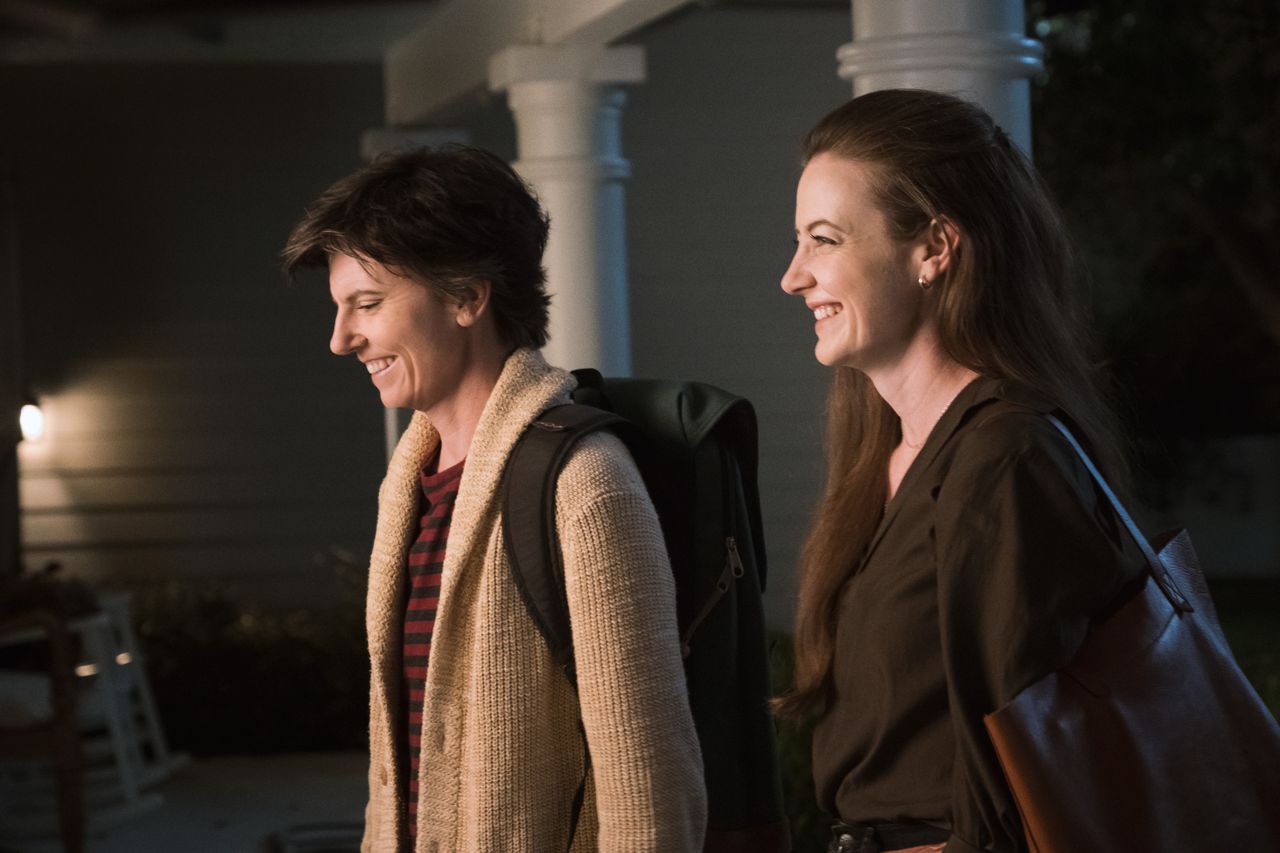The second season of Tig Notaro's One Mississippi is surprisingly hopeful
The show comes out of the darkness and into the light


The second season of One Mississippi — Tig Notaro's TV ode to loss, family, and the South, which drops on Amazon Sept. 8 — is a much brighter thing than its first. The first season of the comedian's semi-autobiographical show tackled her strain of sudden grief and illness with bleak, wounded calm. That's familiar terrain for Notaro, and she's worked it with singular success: Her 2012 standup set at Largo about her cancer diagnosis, near-death from C. difficile, and her mother's fatal accident became a legendary comedy album, Live.
But the question was always how Notaro's show could effectively compete with the raw album on which it was based. On this front, it succeeded: In addition to its more recognizable features, One Mississippi was a love letter to Mississippi and her mother, with the idiosyncrasies of the former somehow structuring the absence of the latter. To Notaro fans, this was a relief: Her breakout set happened five years ago, after all, and there was always a risk that Notaro would get typecast as a "grief comic"; that she'd be unable to break out of that triple-trauma and find new approaches (or a return to the observational deadpan that once characterized her act).
The show did expand beyond Tig's point of view; it was always more capacious than its grief-stricken premise, and made room for other frames of reference — specifically, for her brother and stepfather's experiences of tragedy.
Subscribe to The Week
Escape your echo chamber. Get the facts behind the news, plus analysis from multiple perspectives.

Sign up for The Week's Free Newsletters
From our morning news briefing to a weekly Good News Newsletter, get the best of The Week delivered directly to your inbox.
From our morning news briefing to a weekly Good News Newsletter, get the best of The Week delivered directly to your inbox.
What's striking about One Mississippi's sophomore season, then, is how hopeful this "traumedy" (that's Notaro's term) has become. Tig has moved back to Mississippi, and the series' characters are forging ahead diffidently, but with disconcerting optimism.
That they're doing so in relative harmony is the first surprise. The first season excelled, as I wrote last year, at portraying a family in crisis while its hub, Caroline, is dying — "no one embraced anyone," Notaro writes of this experience in her memoir. "That my mother had been the lively, affectionate member of our family was now clearer than it had ever been." One of the driving crises of One Mississippi's first season is that no one responds properly to losing Caroline; not Tig's brother Remy (played by Noah Harpster), not her stepfather Bill (John Rothman). Result: Tig watches her mother die while Bill and Remy go feed the cat.
The season dealt roughly and well with these grim asymmetries; people have different timelines for mourning, and one side-effect is that a traumatic event that should at the very least be unifying — since all three experienced the loss together — resulted instead in chilly fragmentations and the kind of calculus that leaves one character saying, "So that's what she meant to you." Bill's rigidity, his need to abide by the rules, is wounding but understandable; for an orderly man obsessed with taking precautions to live with himself after he failed to take his wife to the hospital and slept while her brain hemorrhaged, a doubling-down on structure makes sense. What One Mississippi does well and gently is render those frameworks of pain, even though they're not Tig's.
But the show's second season has graduated out of this acute phase. Notaro wrote in her memoir, I'm Just a Person, that one day she "landed right back in my body, feeling like the world's most experienced and knowledgeable infant. Everything felt sorted and compartmentalized in a way that my psyche could process. I felt reborn. Breathing was as easy as doing nothing. I was light and available to life again."
It feels like something similar happened to the shell-shocked threesome at the show's center; they've healed enough that they're walking the world with curiosity and openness. They're even (or especially) looking for love.
That turns out to be the season's weakness as well as its strength. Rothman continues to shine as Bill, Tig's repressed, tightly wound stepfather. He creaks from the strain of his irritated plans and good intentions, and his journey is easily the most satisfying (it's hilarious, too). Harpster's Remy, meanwhile, is on an odd religious journey with vaguely racist undertones — his crush on a fellow Civil War re-enactor who happens to be Asian results in him trying to join her church, feeling he didn't belong, and ends with him attending a white church with a racist buddy who harasses women. That the woman in question replies with a grateful "boys will be boys" seems like the kind of thing the show would turn into an object lesson of some kind. Instead, Remy starts dating Desiree (rendered enormously sympathetic by Carly Jibson). She's a single mother who quickly moves in to Bill's house (which Remy shares). The jokes should write themselves.
But they don't. Tig's skepticism, which is real, isn't actually permitted to judge the relationship. The result is both more interesting than one-note jokes about rednecks — or whatever version of the show Tig's single perspective would produce — but it's also less focused than it could be.
Finally, there's Tig's love interest (and real-life partner) Stephanie Allynne. The show has fun rendering Tig's romantic fantasies about this woman — one sequence has them holding hands in a variety of absurd, life-saving scenarios — but it could honestly use more of that, because it's otherwise a little hard to understand why we're rooting for this relationship. It's possible that Notaro finds Allynne's charms so self-evident that they don't need to be written. But because they aren't really written in, and because Allynne, while amiable, isn't a particularly good actor, there's a funny flatness to their scenes together. Notaro reacts to Allynne vaguely furrowing her brows with a flurry of telling microexpressions. It feels like one is running circles around the other.
That's true even within the show's own universe: Kate, Allynne's character, is really just a conversational prod for Tig's storytelling in the show they produce together. As Tig's straight man, she doesn't get to have many insights or surprising moments; she's there to elicit the good stuff from Tig. There's one possible exception: Much has been written about a storyline in One Mississippi in which someone masturbates at Allynne's character while she's in the room; it's been widely interpreted (with help from Notaro) as a reference to the rumors about Louis CK, who remains an executive producer on Notaro's show even though he appears to be uninvolved, and despite the fact that he and Notaro have clearly had a falling out.
More will be written about the ramifications of that storyline, but what struck me about it (and other beats in One Mississippi, like when a hospital orderly tries to keep Tig from seeing her ailing stepfather on the grounds that she's gay), is the verve with which Notaro tackles issues like these without letting them define the moment. If you read coverage of this aspect of the season, you're likely to assume there's a Very Special Episode quality to it. Tonally, that couldn't be more wrong. There's no mercy for Tig's detractors (or for the masturbator), but neither do they in any way get to control the story. The plot pretty spectacularly decenters them. What you remember most about the episodes in which these incidents happen isn't the bigotry or predation; they don't get to be the point.
Given that this show started from a position of stricken passivity — that is, by making the things that happened to its protagonist precisely the point — this is huge. It feels like Notaro is back in the driver's seat, and her character's obsession with storytelling reflects that.
Sign up for Today's Best Articles in your inbox
A free daily email with the biggest news stories of the day – and the best features from TheWeek.com
Lili Loofbourow is the culture critic at TheWeek.com. She's also a special correspondent for the Los Angeles Review of Books and an editor for Beyond Criticism, a Bloomsbury Academic series dedicated to formally experimental criticism. Her writing has appeared in a variety of venues including The Guardian, Salon, The New York Times Magazine, The New Republic, and Slate.
-
 Trump declares 'golden age' at indoor inauguration
Trump declares 'golden age' at indoor inaugurationIn the Spotlight Donald Trump has been inaugurated as the 47th president of the United States
By Justin Klawans, The Week US Published
-
 Where in the world to hop on a hot air balloon
Where in the world to hop on a hot air balloonThe Week Recommends Float above California vineyards, Swiss Alps and the plains of the Serengeti
By Catherine Garcia, The Week US Published
-
 'The death and destruction happening in Gaza still dominate our lives'
'The death and destruction happening in Gaza still dominate our lives'Instant Opinion Opinion, comment and editorials of the day
By Justin Klawans, The Week US Published
-
 Walter Isaacson's 'Elon Musk' can 'scarcely contain its subject'
Walter Isaacson's 'Elon Musk' can 'scarcely contain its subject'The latest biography on the elusive tech mogul is causing a stir among critics
By Theara Coleman Published
-
 Welcome to the new TheWeek.com!
Welcome to the new TheWeek.com!The Explainer Please allow us to reintroduce ourselves
By Jeva Lange Published
-
 The Oscars finale was a heartless disaster
The Oscars finale was a heartless disasterThe Explainer A calculated attempt at emotional manipulation goes very wrong
By Jeva Lange Last updated
-
 Most awkward awards show ever?
Most awkward awards show ever?The Explainer The best, worst, and most shocking moments from a chaotic Golden Globes
By Brendan Morrow Published
-
 The possible silver lining to the Warner Bros. deal
The possible silver lining to the Warner Bros. dealThe Explainer Could what's terrible for theaters be good for creators?
By Jeva Lange Last updated
-
 Jeffrey Wright is the new 'narrator voice'
Jeffrey Wright is the new 'narrator voice'The Explainer Move over, Sam Elliott and Morgan Freeman
By Jeva Lange Published
-
 This week's literary events are the biggest award shows of 2020
This week's literary events are the biggest award shows of 2020feature So long, Oscar. Hello, Booker.
By Jeva Lange Published
-
 What She Dies Tomorrow can teach us about our unshakable obsession with mortality
What She Dies Tomorrow can teach us about our unshakable obsession with mortalityThe Explainer This film isn't about the pandemic. But it can help viewers confront their fears about death.
By Jeva Lange Published